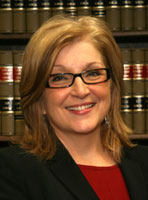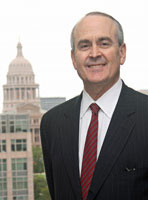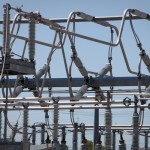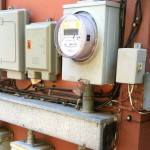Debate Gets Feisty Between Regulators Over Texas’ Power Supply

Courtesy Texas PUC
Donna Nelson, chairperson of the Texas PUC, moved the commission a step closer today to a capacity market.
Public Utility Commission Signals Move to Increase Reliability, Which Could Raise Prices; Anderson Calls Idea “Corporate Welfare”
Meetings of the Texas Public Utility Commission are not a place you go to see fireworks. They usually deal with phone companies, transmission lines, and power generation. But it’s on that last subject where the conversation got a little spicy today.
The chairperson of the commission, Donna Nelson, unexpectedly brought up a proposal that could have wide implications for the deregulated power market in Texas, and could also raise power bills for consumers. Nelson wanted to move the state’s reserve margin — the amount of extra power available at times of peak demand — from its current state of a goal to something that is mandatory. Commissioner Ken Anderson was taken aback.
“I would’ve liked some advance notice, even a memo the day before,” Anderson said. “Saying, I plan to bring this up. Cause this is big.”
“Commissioner Anderson,” Nelson interrupted, “you have handed memos to me at 8 o’clock in the morning as I walk in, right before an open meeting.”
“Not on something this big!” Anderson retorted.
The two commissioners have been deadlocked for over a year on this issue.
At the center of the debate is an idea that would pay power generators in Texas not just for the electricity they produce, but also just for being around. It’s known as a capacity market. There’s a lot of nitty gritty here, but it boils down to one question: Will the state of Texas have enough power for its growing population and potentially hotter summers?

Texas PUC
Texas PUC commissioner Kenneth Anderson
Texas’ current deregulated market is energy-only, meaning power plant owners are only paid for the power they produce. With lower fuel prices (in part thanks to fracking), power companies argue they’re not making enough money to build new plants to keep up with demand. The power companies argue that paying power plants just for being available will help increase the power supply. Today’s meeting showed that there’s a majority on the commission now (Nelson and new appointee Brandy Marty, a former aide to Governor Rick Perry) willing to move forward with exploring such an idea.
Anderson was the lone voice on the commission saying it’s too soon for such a move, even to mandate a minimum buffer between supply and demand. He worries a capacity market could end up charging every day Texans more on their power bills while handing even more profits to power plants. “Why?” Anderson said. “Because they want that corporate welfare payment.”
“It has always been, and will always be, my goal as chairman of the commission, to do the right thing for the people of Texas, both from a reliability standard and a cost standard,” Nelson said today.
Anderson has argued that forecasts of electricity demand have proven wrong — even though Texas’ population is growing, the state isn’t using as much power as expected. He called for waiting until new reports come out this winter that will shed more light on how much power the state needs before moving to a mandated reserve margin, which could likely lead to a capacity market.
Both conservative and consumer groups are against the idea of a capacity market. Some have called the idea “Obamacare for electricity.” The conservative Texas Public Policy Foundation has said that the idea could put consumers on the hook for billions of dollars. And the consumer group Texas Coalition for Affordable Power labeled today’s move “premature.”
“Mandating a reserve margin is the first step toward creating a capacity market that would increase electricity costs by billions of dollars,” Dr. Randy Moravec, executive director of the group, said in a statement.
“Just note for the record — I’m unalterably opposed to it. It’s totally uneconomic. It’s the first step on a slippery, very slippery slope that has the potential to destroy the economic engine that is Texas,” Anderson said at the end of the meeting.
“It could lead to a huge tax on consumers that will not ensure reliability,” Anderson added. “So if we end up going down that road, and adopting some ridiculous construct that is hugely expensive … I want it clear that folks know who to call to complain about why they paid this tax for so many years and still have blackouts.”
It will likely take several more months, if not much of next year, to work out the details. But by a two to one margin today (Nelson and Marty in favor, Anderson against), the commission signaled that it could pursue a capacity market as the path for more reliable power supplies in Texas. And that could end up costing all of us more.

